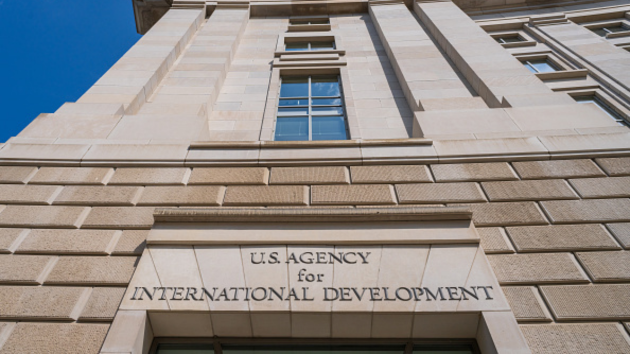
(WASHINGTON) -- International aid organizations are warning that humanitarian efforts in Gaza would be severely impacted if the U.S. Agency for International Development (USAID) is shut down by Elon Musk's Department of Government Efficiency.
Musk said he was "in the process" of "shutting down" the agency -- which oversees foreign aid, disaster relief and international development programs -- and that President Donald Trump agreed with him.
Meanwhile, Secretary of State Marco Rubio told reporters on Monday that he had been appointed acting director of USAID, saying the agency is "not functioning" and that it needs to be aligned with U.S. national interests.
Alex Smith, a former contractor for USAID who advised on nutrition, child health and maternal health, told ABC News that the dismantling of the agency could have a major impact on aid in Gaza.
"It's going to be devastating," said Smith, who left the agency last year. "You know, countries are already trying to figure out how they're going to fill the gaps, but they just don't have the money, and finding new donors could take years."
Smith noted that the Trump administration said previous federal funding freezes wouldn't affect emergency food programs, but that the USAID also provides humanitarian assistance on other fronts.
"There's a lot more than food aid that USAID does. That's a kind of common misconception -- that all we do is just drop off big bucks and food," he said. "It's about fighting infectious disease, malaria, TB, HIV all over the world. You know, with the conditions in Gaza as they are, we've seen some polio. It's very likely that cholera is already there and it's going to get worse. So we used to have a lot of programs to try to combat those specific infectious diseases."
Jesse Marks, senior advocate for the Middle East at the humanitarian organization Refugees International, told ABC News he's worried the stoppage of aid from USAID could put the Israel-Hamas ceasefire in jeopardy.
"An aid freeze in general, but particularly for Gaza, threatens to undermine what has already been a fragile ceasefire, and the potential for phase two and phase three release of hostages," Marks said.
"I think one of the facets of this that people are not necessarily connecting is that the humanitarian access to Gaza -- which is underpinned by USAID, State Department funds -- was a central feature of the bargain that underpins ceasefire," he continued. "So, if you remove aid to Gaza, whether directly or as a second-order effect of the aid freeze, this raises the risk of a broader ceasefire collapse."
USAID has been contributing aid to Gaza and the West Bank since at least 2021, with increased aid after the Israel-Hamas war broke out.
In November 2024, USAID announced it was providing $230 million in additional funding "to support economic recovery and development programs in the West Bank and Gaza." It has given more than $2.1 billion in humanitarian assistance since Oct. 7, 2023.
The U.S. Office of Palestinian Affairs said funding from USAID would allow the agency's partners to provide food assistance, emergency health care and psychosocial services, and could help with providing access to clean drinking water, hygiene products and sanitation services.
In a statement to ABC News last week, the nonprofit International Medical Corps (IMC) said it had received $68 million from USAID to set up and run two large field hospitals in Gaza so it could treat more than 33,000 civilians per month.
The spokesperson also rejected claims from a U.S. State Department official that IMC had used funding from USAID to procure or distribute condoms.
USAID was partly responsible for renewed international pressure on Israel to increase the flow of aid into Gaza.
In April 2024, USAID Administrator Samantha Power testified before Congress, stating that parts of Gaza were experiencing a famine and that conditions were "as dire as any I have seen in my career."
Her assessment came after a March 2024 report from the Integrated Food Security Phase Classification that famine was "imminent" in northern Gaza and the entire population was experiencing high levels of food insecurity.
Later that day, Israeli military spokesman Rear Adm. Daniel Hagari told reporters that Israel was constructing a new land crossing from Israel into northern Gaza to facilitate more aid deliveries based on previous promises made by Israeli Prime Minister Benjamin Netanyahu.
Aid organizations including Médecins Sans Frontières (MSF), or Doctors without Borders, and Oxfam, a group made up of 21 independent NGOs, have called on the U.S. government to halt the shutdown of USAID.
"Dismantling USAID would be a callous, destructive political power play that would have deadly consequences for millions of people living in dire humanitarian emergencies and extreme poverty," Abby Maxman, Oxfam America president and CEO, said in a statement.
ABC News' Katherine Faulders, Shannon Kingston, MaryAlice Parks and Will Steakin contributed to this report.
Copyright © 2025, ABC Audio. All rights reserved.

